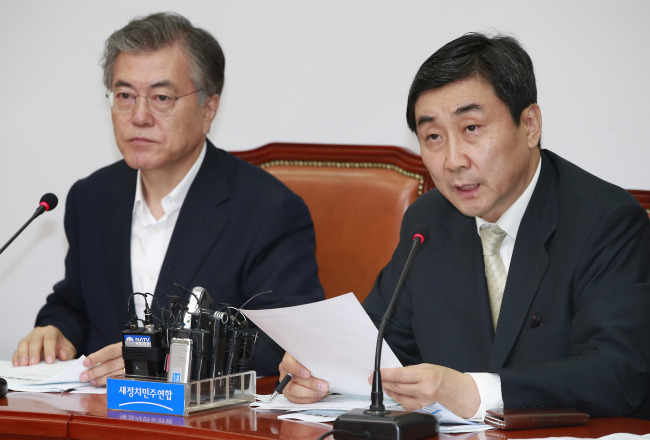The main opposition party reignited a heated political debate Monday by suggesting as part of its electoral reform plan to raise the number of lawmakers from the general elections next year.
The proposal prompted different reactions and interpretations from main and minor parties, cautiously tiptoeing around a potential rise in the number of parliamentary seats and the negative public opinion over lawmakers’ prerogatives.
Kim Sang-kon, head of the reform committee of the New Politics Alliance for Democracy, Sunday unveiled a package of restructuring measures to increase the number of legislators elected through the proportional representation system, which could, in turn, raise the total number of parliamentary members from the current 300 to 369.
“I urge the party to begin an in-depth discussion on increasing the number of lawmakers,” he said at a news conference.
The rationale behind the drastic reform measure is aimed at breaking down the existing political regionalism and to ensure the election results better reflect the proportion of support gained by each competing group, Kim said.
 |
| NPAD floor leader Rep. Lee Jong-kul speaks at a party meeting on Monday. (Yonhap) |
The proposal is highly sensitive as it could prompt a drastic change in the political landscape here. But some observers say it would be difficult for the opposition party to get the public’s consent, as the measure is widely viewed as allowing more politicians to seek vested interests by acquiring a parliamentary seat.
Kim proposed to keep the current number of lawmakers elected through the first-past-the-post system at 246 to represent the constituencies, but sharply raise the number of lawmakers elected through proportional representation to 123.
The NPAD at first appeared divided by this proposal. Even NPAD chairman Moon Jae-in put the brakes, saying it is “inappropriate” to discuss the matter now. But the floor leader of the main opposition party voluntarily entered the debate, vowing the NPAD would set the proposal as a plank in its party platform.
“This is important for political reforms,” he said. “If it is inevitable to increase the number of lawmakers, then it would be a realistic way to accept that idea,” he added.
The ruling Saenuri Party, for the time being, blasted the opposition party, saying it is turning a blind eye to the public’s demand to raise the parliament’s productivity, in terms of legislating laws meant to improve people’s lives.
“Quality is more important than quantity,” said Rep. Won Yoo-chul, the floor leader of the ruling party, during a supreme council meeting.
“This is the time to push for political reforms by giving the public the right to pick candidates for parliamentary seats,” he said, referring to an open primary system recently proposed by the party.
The proposal corresponds to a recent draft revision to laws submitted by the National Election Commission in February. The election watchdog suggested the parliament consider rezoning the electoral constituencies into six zones for the proportional representation seats and mete out the parliamentary seats accordingly with the percentage of votes garnered by parties in each constituency.
The proposal was also backed by a Constitutional Court ruling last year that said population discrepancies among some electorates were too high. The nation’s highest court last October ruled that some constituencies were underrepresented in the legislature. Those with populations one-third the size of larger voting districts are granted the same number of lawmakers. The court said the population gaps were unconstitutional.
Since then, political parties have geared up for discussion on electoral reforms by creating a parliamentary panel to restructure electorates throughout the country. The two sides, however, have been spinning their wheels instead of making progress, as they have faced widespread public criticism for trying to increase the number of politicians already enjoying exceptional privileges.
South Korean legislators are under fire for receiving higher pay and being granted more prerogatives than other elected politicians in advanced countries. The reputation and public trust of legislators have remained low due to a series of corruption scandals involving incumbent lawmakers from both the ruling and opposition parties.
By Cho Chung-un (christory@heraldcorp.com)

